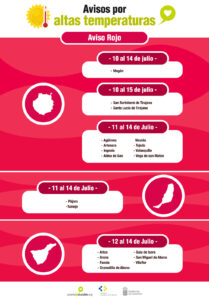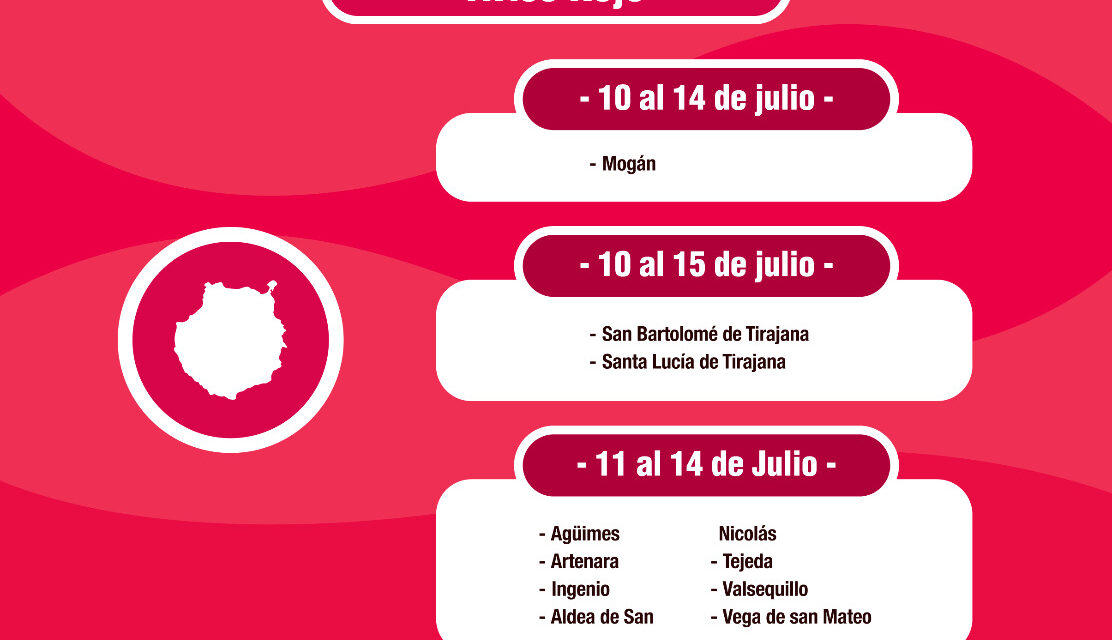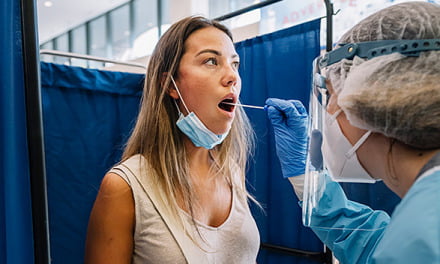High temperatures
Activation of a red alert, indicating high risk, for several municipalities of the islands of Gran Canaria, Tenerife, and Fuerteventura.
The Ministry of Health of the Government of the Canary Islands, through the General Directorate of Public Health, the Monday issued warnings from the Preventive Actions Plan for the Health Effects of Excessive Temperatures on different islands to reduce the negative health effects associated with excessive temperatures and coordinate institutions on the Canary Islands involved: healthcare centres, emergency services, and municipalities affected by the forecasted alert situations, in collaboration with the Spanish Meteorological Agency (AEMET).
 GRAN CANARIA
GRAN CANARIARed alert (high risk):
From July 10th to 14th in Mogán;
from July 10th to 15th in San Bartolomé de Tirajana and Santa Lucía de Tirajana;
from July 11th to 14th in Agüimes, Artenara, Ingenio, La Aldea de San Nicolás, Tejeda, Valsequillo, and Vega de San Mateo.
FUERTEVENTURA
Red alert (high risk):
From July 11th to 14th in Pájara and Tuineje.
TENERIFE
Red alert (high risk):
From July 12th to 14th in Arico, Arona, Fasnia, Granadilla de Abona, Guía de Isora, San Miguel de Abona, and Vilaflor.
 The General Directorate of Public Health, which has been coordinating the Preventive Actions Plan for the Health Effects of Excessive Temperatures in the Canary Islands since 2004, has established a system for epidemiological surveillance of the impact of high temperatures on the health of the population, in coordination with healthcare centers and emergency services in the Canary Islands, as well as providing notification to these centers and the affected municipalities regarding the forecasted alert situations.
The General Directorate of Public Health, which has been coordinating the Preventive Actions Plan for the Health Effects of Excessive Temperatures in the Canary Islands since 2004, has established a system for epidemiological surveillance of the impact of high temperatures on the health of the population, in coordination with healthcare centers and emergency services in the Canary Islands, as well as providing notification to these centers and the affected municipalities regarding the forecasted alert situations.
Furthermore, Public Health provides information to the media aimed at providing useful advice and practical measures to prevent the effects of exposure to high temperatures.
Temperature thresholds and risk levels
The temperature thresholds established in 2023 are 33º Celsius for the province of Las Palmas de Gran Canaria and 34º Celsius for the province of Santa Cruz de Tenerife.
The criteria for assigning health risk levels for situations of excessive temperature, determined by the Ministry of Health, are based on a decision algorithm. Based on this algorithm, which takes into account the forecasted maximum temperatures, the established threshold, the number of consecutive days (a minimum of three), and the risk factors specific to each territory, four risk levels are determined:
- – Level 0 (green), indicating no risk.
– Level 1 (yellow), indicating low risk.
– Level 2 (orange), indicating medium risk.
– Level 3 (red), indicating high risk.
Recommendations
Vulnerability to high temperatures refers to personal risk factors, including such as being over 65 years old, infants, pregnant women, etc., as well as environmental, local, and occupational factors, among others.
The are recommendations aimed at the particularly vulnerable population:
- – Stay in cool places, in the shade, or air-conditioned areas as much as possible and refresh oneself whenever necessary.
- – Reduce physical activity and avoid outdoor sports during the hottest hours of the day.
- – Drink water or fluids frequently, even if not feeling thirsty, regardless of the level of physical activity.
- – Avoid drinks with caffeine, alcohol, or high sugar content, as they can contribute to dehydration.
- – Pay special attention to infants, children, pregnant or lactating women, as well as older adults or individuals with conditions that may worsen with heat (such as heart diseases, kidney diseases, diabetes, hypertension, obesity, cancer, mobility impairments, dementia, and other mental illnesses, as well as drug or alcohol abuse). However, anyone can experience problems related to heat.
- – Wear light, loose-fitting clothing that allows perspiration.
- – Do not leave anyone in a parked and closed vehicle (especially infants, children, older adults, or individuals with chronic illnesses).
- – Consult a healthcare professional if experiencing symptoms that persist for more than an hour and may be related to high temperatures.
- – Consume light meals that help replenish lost salts due to sweating (salads, fruits, vegetables, juices, etc.).
- – Store medications in a cool place; heat can alter their composition and effects.
Other preventive plans in the Canary Islands
In the event of a forecasted high-temperature situation, the Government of the Canary Islands can activate the Health-Related Excessive Temperatures Prevention Plan, with risk alerts for health, as well as other plans such as the Specific Civil Protection and Emergency Response Plan for Risks from Adverse Weather Phenomena (PEFMA), by declaring a risk situation alert for the population, property, and the environment.













